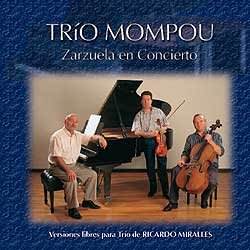In the days before
musak and the ubiquitous video screens
which animate even her metro platforms
these days, salon arrangements of zarzuela
music used to be as much a staple of
Madrid life as "Palm Court" Light Classics
here in England. With an insatiable
public ever eager for a new zarzuela
fix, few successful works escaped being
instantly quadrilled, pot-pourried,
arranged and transcribed to a point
which must have driven sensitive souls
as mad as the inescapable thump of pop-rock
beat does today.
Not that this music
is to be undervalued or patronised.
To lump zarzuela in with flamenco, for
example, as "traditional Spanish music"
(as too many old-school Anglo-Saxon
critics have done, and still do) is
about as sensible as putting Gilbert
and Sullivan in the same basket as the
Highland Reel! Zarzuela is an urban
genre, with all the cosmopolitan influences
you'd expect, but with huge musical
sophistication to match. Its Hispanicism
is authentic, all right, but of a very
different nature from the Andalusian
voice we've for too long thought of
as the one "true" Spanish music. As
one member of the audience at La
verbena de la Paloma (Edinburgh
Festival 1997) put it "It's like Carmen,
but the real thing!"
These wrongs are slowly
being righted, and Catalan composer
Ricardo Miralles' arrangements for piano
trio are conservative and respectful,
a mixture of medleys and concentrated
reminiscences on single favourites.
He takes no musical risks, following
the original melodies and harmonies
in so far as that's practicable within
chamber constraints, and though the
results lack the piquancy and force
of the originals, it all makes pleasant
enough background listening. The programme
notes (by pianist Sarmiento, in Spanish
and English) are exemplary, good on
context and detailed in description
of the particular pieces we are hearing.
If joins between tunes
are hardly seamless in the potted versions
of El barberillo de Lavapiés,
Luisa Fernanda and La verbena
de la Paloma, the more extended
suite of highlights from Doña
Francisquita works much better,
with Miralles making space to flex his
own creative muscles. His arrangement
of the tenor-soprano duet "Siempre
es el amor" is delicate and touching.
Last and not least is the "encore" number,
a perky saunter through the Coro
de barquilleros (wafer sellers)
from Agua, azucarillos y aguardiente.
The Trío Mompou
have been held in high esteem since
they came together in 1982, particularly
for their championship of contemporary
Spanish chamber music. Twenty years
on, Sarmiento and Furnadjiev are unimpeachable;
but though violinist Joan Lluis Jordá's
sensitivity is never in doubt the fallibility
of his intonation might lead to a queasy
moment or two over the tortilla. This,
added to the prevailing gentleness of
the musical fare, precludes a recommendation
for the general listener. On its own
terms, though, the CD makes for enjoyable
enough tafelsmusik to bring pleasure
to aficionados keen to play "spot that
tune" in the midst of the teatime chat.
Christopher Webber
